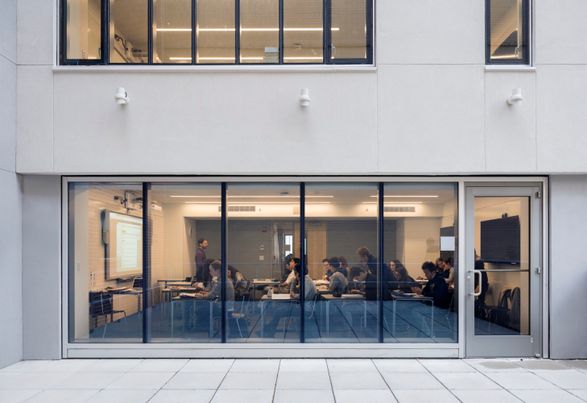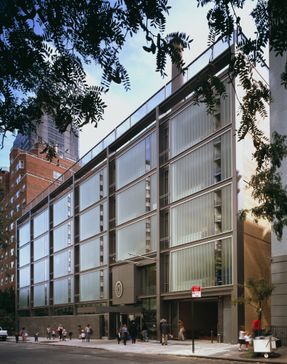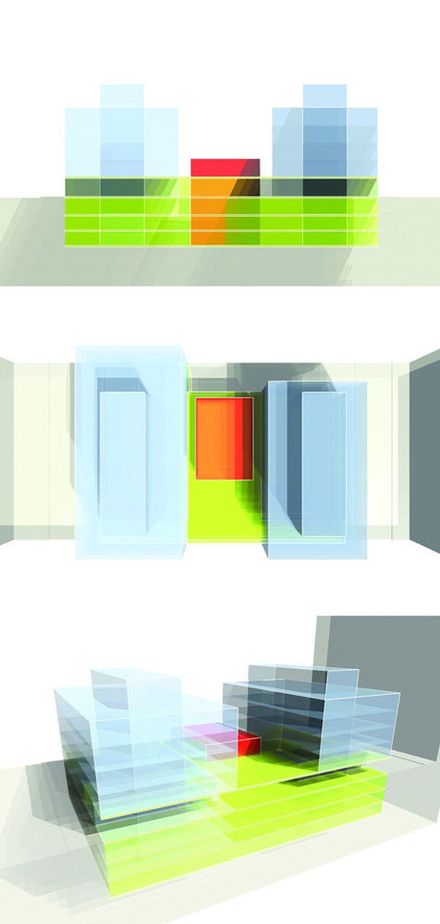
Lycée Français de New York
ARCHITECTS
Ennead Architects
PROJECT MANAGER
Joanne Sliker AIA, LEED AP
MANUFACTURERS
Bendheim, Pyrok, Carnegie, Forbo Flooring Systems, Mondo, Oldcastle APG, Oldcastle BuildingEnvelope, PPG IdeaScapes, TGP, Vogl Decken systeme / Acoustic Ceiling panels, Wausau Window and Wall Systems
MANAGEMENT PARTNER
Joseph Fleischer FAIA
PROJECT ARCHITEC
Chris Andreacola
SENIOR TECHNICAL DIRECTOR
James Sinks AIA
DESIGN PARTNER
Susan T. Rodriguez FAIA
STRUCTURAL ENGINEER OF MAIN BUILDING
The Cantor Seinuk Group
MEP ENGINEER OF MAIN BUILDING
Thomas Polise Consulting Engineer
LIGHTING DESIGN OF MAIN BUILDING
Brandston Partnership
THEATER OF MAIN BUILDING
Harvey + Marshall Associates
GRAPHICS OF MAIN BUILDING
Poulin + Morris
PARKING OF MAIN BUILDING
Philip Habib & Associates
LANDSCAPE ARCHITECT OF MAIN BUILDING
Judith Heintz Landscape Architecture
GEOTECHNICAL OF MAIN BUILDING
Langan Engineering & Environmental Services
AUDIOVISUAL / TELECOMMUNICATIONS / DATA OF MAIN BUILDING
Harvey + Marshall Associates
SPECIFICATIONS OF MAIN BUILDING
Construction Specifications, Inc.
ELEVATOR OF MAIN BUILDING
Irons Elevator Design Services, Inc.
EXPEDITING OF MAIN BUILDING
Design 2147
CONSTRUCTION MANAGER OF MAIN BUILDING
F.J. Sciame Compa
ACOUSTICS OF MAIN BUILDING
Shen Milsom & Wilke
PHOTOGRAPHS
Richard Barnes
AREA
176000 ft²
YEAR
2016
LOCATION
New york, united states
CATEGORY
Schools, refurbishment
Text description provided by architect.
Ennead has worked with Lycée Français de New York for over 15 years, beginning with the design of the Main Building in 2003, which unified the school which was once housed in six separate buildings into a single location.
Since then, Ennead has worked with Lycée Français de New York every year to respond to the school’s curricular evolution.
Most recently, Ennead expanded the school to accommodate for their transformed curriculum while providing a new dignified presence on York Avenue.
Main Building (2003) The Lycee Francais de New York revitalizes a vision for a new international, multicultural school that fulfills the need of a unique curriculum and the school’s more than 1,000 students.
Intended to convey the rigor and order of the school’s French pedagogy, the design is inspired by the school’s unique history in New York City, the memory of the six original Beaux Arts building that had defined its previous home, and the rhythms, forms and materials of New York City’s dense Cartesian landscape.
Spatial variety, rational planning principles and sectional organization, attention to proportion, façade syncopation, expressed structure and materials are unified in a dynamic framework.
Located on a through-block site between 75th and 76th streets on the Upper East Side of Manhattan, the school is made up of two buildings connected by a three-story base – one above and two below-grade.
A central courtyard acts as the ͞Coeur͟ of the Lycee, creating the opportunity to define a true French cultural center and landscaped focal point.
Two distinct faces to the city, north and south, reflects upon the inherent duality of French and American culture and the solar orientation of the building.
The north façades are characterized by translucent channel glass systems, which capitalize on natural and reflected light.
The sough sides are pre-cast concrete reminiscent of the limestone facades of the school’s original building.
Internally, shared school-wide program spaces such as libraries, cafeteria, auditorium and gymnasiums unify the school at the three lower levels.
Above ground, the southern structure is designated as the secondary school while the northern structure is the maternelle and primary school.
The rooftops of both structures are used for recreation and outside gathering. York Wing (2016) The new wing at the Lycee Francais de New York, positioned prominently on York Avenue, creates a more public face to the school on the avenue and a new point of access into the main facility from the City.
The addition is strategically connected to the main building providing important new spaces for teaching and learning. In addition to new classrooms, administrative offices and study areas, a double height media lab – a state-of-the-art broadcast studio – forms the intersection between the two buildings and equips the school for its role as a center for cultural exchange.
The design supports a renewed focus on the importance of sustainability and community incorporating energy efficient systems, a rooftop wind turbine and the use of recycled channel glass providing daylight throughout with views back to the city from the top floor.






























